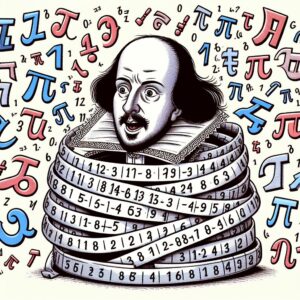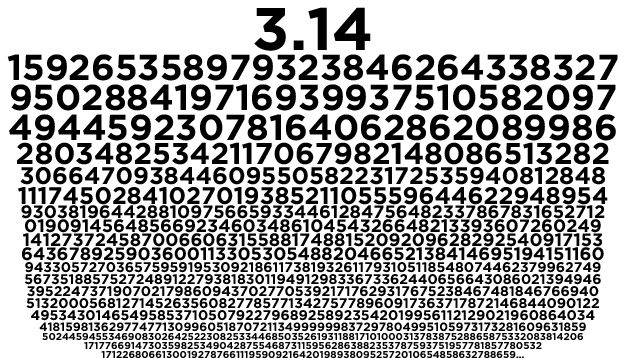
I thought that for Pi Day this year, we could look at this age-old question. In short, it goes something like this: “Since pi is infinite and non-repeating, does that mean that if you encoded the letters in Shakespeare’s work to numbers, that we could find the complete works of Shakespeare in the digits of pi?”
Short answer? No. (Or, to be specific about it, “It’s not proven, no.”)
Here’s a video that explains it better than I can:
Here’s the problem in a nutshell. People tend to think of “infinite” as “representing all possible combinations,” and that’s an incorrect assumption. Say, for example, that we had the repeating sequence 1, 0, 11, 0, 111, 0, 1111, 0 … and so on. That sequence is infinite and non-repeating. However, you can easily prove that it does not contain all possible number combinations.
The term for what we want to happen is for the digits of pi to be a “normal” infinite number, which means that all combinations are equally likely to occur. If that proves to be true – which it has not yet – then yes, you would have a case that the works of Shakespeare would appear.
However, you will have a different “multi universe” problem. If you assume that all possible combinations exist within pi, that means that Macbeth does. As well as Macbeth with a happy ending, Macbeth as a cat, Romeo and Juliet where they’re both transgender and live happily ever after, and, yes, even the complete works of the Earl of Oxford. Literally, every combination is possible, whether they make sense or not. You could probably state that they are in there, but you would not be able to extract them to find the subsequent great works of English literature. So then, it literally has no value at all.
Personally, I find it much more interesting to determine where your name appears in pi or the longest string of repeating digits in pi.
On a completely different note, my daughter won her school’s Pi memorization contest when it was her turn a couple of years ago, and now her younger brother is up. Hope he successfully defends her title! I’ll have to let everybody know how it goes since I’m scheduling this in advance 🙂

Conclusion
I see this question come up periodically, and I don’t think that we’ve covered it recently, so I wanted to make sure we had something to say about the subject. No, as of right now, we do not have proof that the digits of pi contain Shakespeare’s works. Or any other string of significant length. But it’s fun to think about, isn’t it? If this question even occurred to you in the first place, you’ve got some geek in you! Welcome to the club.
Happy Pi Day, everybody!

do you know the 9,999,999,999,999,999,999,999,999,999,999,199,234,765th digit of pi
do you know the 100,000,000,000,000,000,000,000,000,000,000,000,000,000,000,000,000,000,000,000,000,000,000,000,000,000,000,000,000,000,000,000,000,000,000,000,000,000,000,000,000,000,000,000,000,000,000,000,000,000,000,000,000,000,000,000,000,000,000,000,000,000,000,000,000,000,000,000,000,000,000,000,000,000,000,000,000,000,000,000,000,000,000,000,000,000,000,000,000,000,000,000,000,000,000,000,000,000,000,000,000,000,000,000,000,000,000,000,000,000,000,000,000,000,000,000,000,000,000,000,000,000,000,000,000,000,000,000,000,000,000,000,000,000,000,000,000,000,000,000,000,000,000,000,000,000,000,000,000,220,220,220,220,220,220,220,220,220,220,220,220,220,220,220,220,220,220,220,220,220,220,220,220,220,334,556,789,888,777,666,555,444,333,222,111,999,000,123,456,789th digit of pi